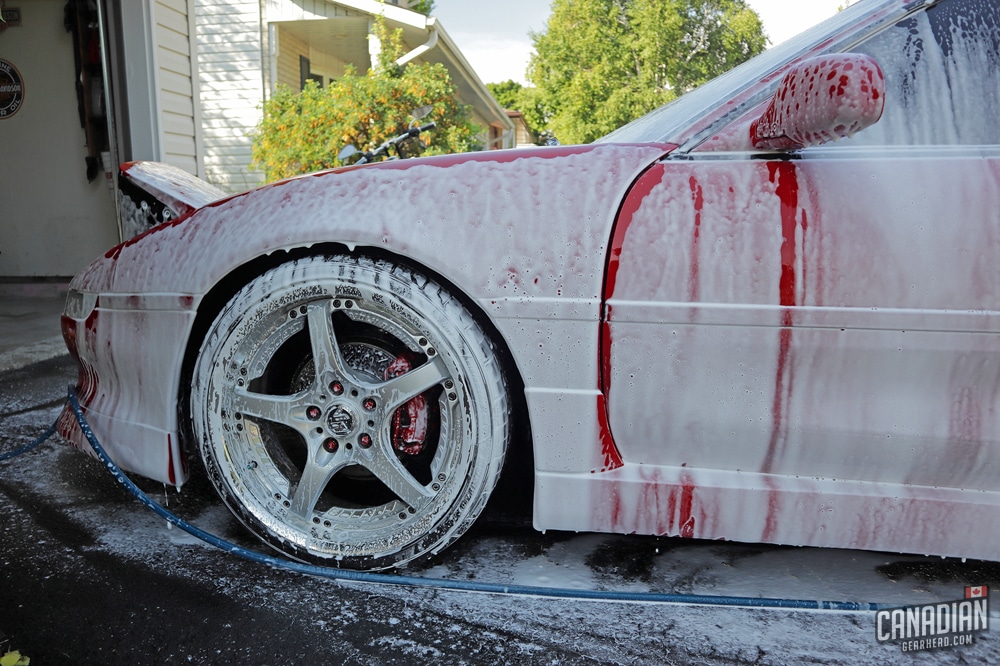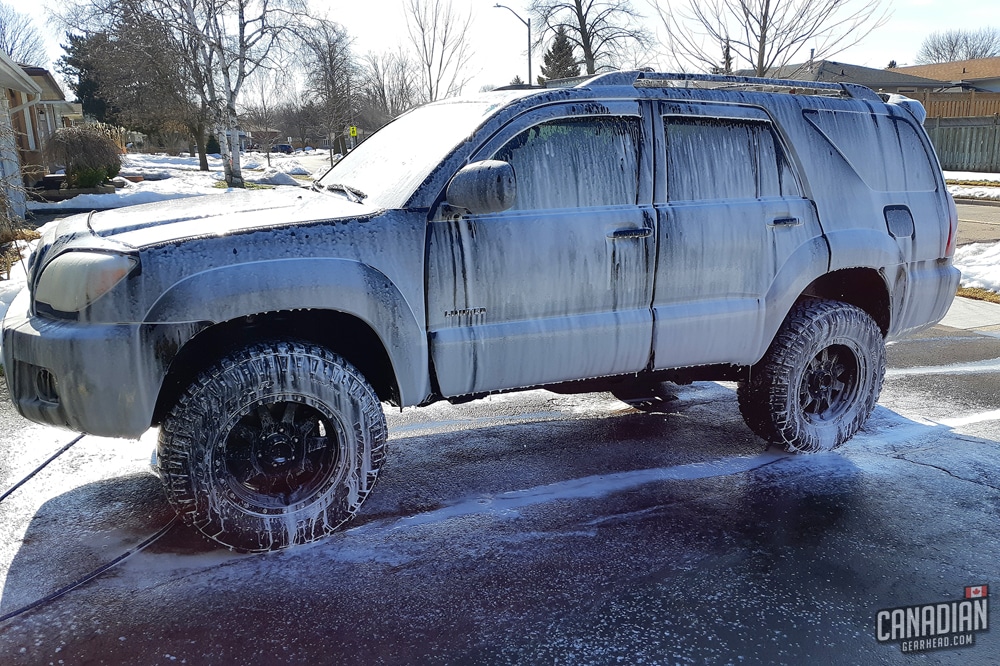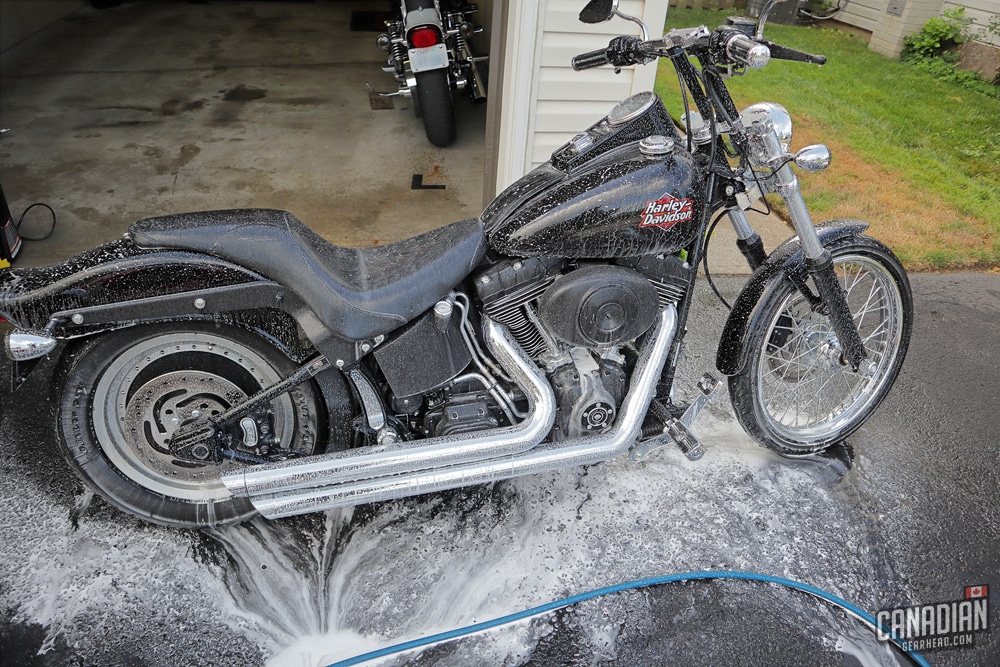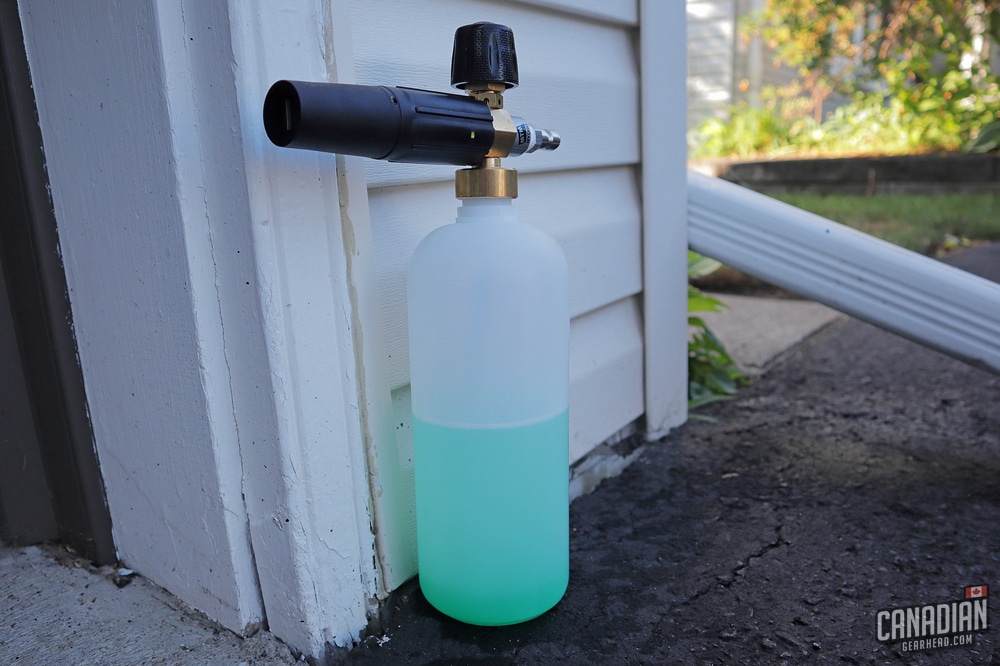


As an affiliate, we may earn a commission from qualifying purchases. We get commissions for purchases made through links on this website from Amazon and other third parties.
Support us by sharing our content!
Foam cannons have become one of the most commonly seen tools in the detailing industry. So common, that many car enthusiasts with very little detailing experience will use one every time they wash their vehicle. Do you actually need to use a foam cannon regularly to wash your car though?
Using a foam cannon the way most people do will not get your car any cleaner than a traditional wash. Rinsing with a hose or pressure washer will provide the same cleaning power as foaming the vehicle first with ph-neutral soap before rinsing. The pressure of the water is what does the most work.
A foam cannon is a detailing tool that is intended to help during the washing stage of a car. It is basically a canister with a nozzle on it that plugs into a pressure washer. Filling it up with car soap and spraying it creates a thick foam that almost looks like shaving cream.
To be clear, a foam cannon doesn’t make a difference when used the way most people use it. Using a snow foam that’s intended to strip wax and grease or stronger cleaners in a foam gun will actually boost the cleaning ability. The problem is that most people just use the same ph-neutral soap that’s in their wash bucket.
Spraying a mild soap on your car, allowing it to dwell, then spraying it off will do nothing more than the equal amount of rinsing itself. Here’s the thing: we use these ph-neutral soaps because they aren’t powerful enough to strip carnauba wax off of our paint. Wax is also known for being the weakest form of protection in terms of durability – and it still doesn’t remove it.

Now think about all the dirt, grime, and grease that your car gets covered in when it needs to be washed. That road grime (or traffic film) is made up of things like engine oil, transmission fluid, coolant, tar, and brake fluid. The same soap that can’t even strip wax doesn’t stand a chance at removing all of that – at least not without some scrubbing.
If you don’t believe me, try it out. Take a car that’s been driven in the rain and go through the same process. Rinse, foam, rinse. You’re going to see the layer of film is still on the paint. In terms of cleaning power, you’re just wasting soap. Any dirt and dust that you might have removed was likely due to rinsing with the pressurized water.
There are times when using a foam cannon is beneficial. The biggest draw to using one is the ability to add extra lubrication to a car when washing it. This is especially helpful on vehicles with soft and easy to scratch paint as well as really dirty ones. Spraying foam on the surface immediately before you begin washing with your mitt will keep it extra slick and less likely to scratch.
Using a foam cannon with a stronger soap can be very effective at stripping any remaining wax or sealant from a car before reapplying it or before performing a paint correction.
Usually, this is what you see the pros doing in videos online. DIY detailers see this and expect that copycatting this with their regular ph-neutral soap will do the same thing – it doesn’t. You need to use an all purpose cleaner or strong soap intended to strip wax and grease.
This combined with using a brush to get into any gaps or around emblems is a good way to make sure the car is thoroughly clean leading up to machine polishing.
Another good use of a foam cannon is on vehicles that are more intricate when it comes to getting soap on them. Motorcycles are a good example. Foaming a motorcycle then scrubbing with a brush is a quicker and easier method than trying to get in with a towel and spray bottle and working every piece individually.
Perhaps the most controversial use for a foam cannon is touch-free washing. A lot of car soap manufacturers claim their product will encapsulate dirt and pull it off the surface. The thinking behind this is that by spraying foam on a car and letting it run off, it will gently remove the dirt without needing to be scrubbed.

I can’t say I’m convinced that this is true. I still believe that rinsing with pressurized water either before or after the foam is what’s actually removing the dirt. And yet I still use this method on my MR2 sometimes.
For cars that only have a light layer of dirt or dust on them (haven’t been driven in bad weather), I find this method does a decent job. Why do I bother with the soap if it isn’t doing something magical to remove dirt?
Simply rinsing with water tends to result in water spots. You might notice that your car doesn’t bead water as much when rinsing off some car soaps – that’s by design. Manufacturers want their soap to leave a very light film behind to cause the water to sheet rather than bead. This helps to eliminate water spots and the film doesn’t stick around very long at all.
Rinsing, foaming, rinsing, and blowing dry this car allows me to safely get the dust off without having to touch it at all. Remember, every time we wipe our paint, we risk scratching it. On extra delicate cars that aren’t very dirty, I find this is a reasonable solution. Does it get the car as clean as a regular wash? Not quite. But in some rare cases, avoiding scratches is more important.
The final reason why a foam cannon might come in handy is actually for professional detailers to advertise their services. Covering a car with white foam looks fun and neighbors are nosy. When they see a mobile detailer pull up and use a foam cannon on a car, other potential customers are intrigued. This is a great way for them to draw attention to their services and gain new customers.
“Bob from down the street hires a guy to cover his whole car in foam – that must be why it’s so clean all the time!”
Now don’t get me wrong. If you enjoy using your foam cannon on every wash, feel free to do so. This is just meant to be a guideline for when it isn’t necessary.
The only real reason not to use a foam cannon is the amount of soap it wastes. If you’re gaining the benefits from using it, this is just a trade-off. But if you don’t need to use your foam cannon, you’re quite literally pouring soap down the drain. Depending on your soap of choice, that can get expensive.
Foam cannons use quite a bit of soap if you want thick, foamy suds. You’ll find you’re going through your bottle of soap much quicker if you’re foaming your car often.
Obviously, adding an extra step in your wash process will add more time as well. Even more so when comparing a 2 bucket wash with a garden hose vs setting up a pressure washer and foam cannon.
A car that is already riddled with scratches and swirl marks has very little to gain by using a foam cannon. The whole idea is to lubricate the surface to avoid scratches but if they’re already present, what’s the point? Again, you’re just wasting soap. It’s much more important when washing a car that has undergone a paint correction recently.

These two tools are often confused with each other but they aren’t quite the same. The difference is very simple: a foam cannon is meant to be used with a pressure washer and a foam gun is meant to be used with a regular garden hose.
So which one works better? The foam cannon is a very clear winner. It provides the thickest, most uniform foam on the car. Because of that, it tends to stay on the surface quite a bit longer.
That doesn’t mean a foam gun doesn’t work too. It just doesn’t work nearly as well. Using a foam gun is more like dumping a bucket of soapy water on the surface. Sure, it spreads suds all over your car but they’re nowhere near as thick and won’t cling to the paint as well. A foam gun isn’t as effective but it’s better than nothing.
Foam cannons and foam guns tend to be somewhat similar in price for the tools themselves. The biggest cost difference is the fact that the cannon needs to be used with a pressure washer.
You can save some money by using a cheaper electric pressure washer but it’ll still cost a couple hundred bucks. Keep in mind you might also need to buy additional fittings to make it all work. In contrast, a gun will connect to your garden hose just like a regular nozzle does. That means it also requires less time to set up.
If you’d like to learn more, I have a separate article about how foam guns compare to foam cannons.
Every soap is a bit different so it’s best to go with the manufacturer’s recommendations on the bottle (if there are any for foam cannon use). Otherwise, 2-3 oz of soap is a good starting point if you plan to fill the rest up with water.
Some people find that using warm water in the canister makes it easier to get the soap mixed up. It’s sometimes beneficial to add some water first if your soap is really thick – that’ll keep it from sticking to the bottom of the canister.
If you still aren’t seeing thick enough foam, feel free to adjust the dilution by adding more soap. Your pressure washer, nozzle, cannon, and soap can all affect the type of foam you’ll end up with so there isn’t an exact dilution ratio for every setup.
In the event that your foam cannon isn’t performing as well as it used to, make sure to check out this article on diagnosing problems with your foam cannon:
The reality is that you probably don’t need to use a foam cannon unless you enjoy using it. It might add a little safety with some extra lubrication on soft paint, but it’s really more of a novelty item.
If you’re on a budget and have to pick and choose which equipment you buy, the pressure washer itself is much more useful. You can skip the foam cannon and still be able to get your car just as clean. In my opinion, that money could be better spent on an entry level DA polisher.
Yes! Unless your car only has a light layer of dust, you’re going to need to follow up with a traditional wash using a mitt. Since the majority of car soaps are ph-neutral, they aren’t strong enough to do all of the heavy lifting without being agitated.
There are quite a few ways to use a foam cannon whether you use it to spray soap on the car then agitate with individual towels or wash mitts or you treat it as a separate step on top of the 2 Bucket Wash Method. That’s entirely up to you but no matter what, you’re going to have to do some scrubbing. You can read more about the 2 Bucket Wash Method in this post:
Technically, any decent quality car soap will do the job fine. Some soaps work better than others though. Adam’s Car Shampoo is a big favorite among the detailing community although it’s a bit on the pricier side.
Meguiar’s Gold Class Car Wash is cheaper and easier to find locally but might not foam up quite as well. There are also foam cannon specific car soaps on the market but whether or not they work better is arguable.
If the consistency of the foam is important to you, the settings and dilution of your foam cannon setup are what you need to pay attention to. Even with the best foaming soap, adding too much water to the canister will dilute it and result in weaker suds. On the other hand, taking the time to dial in your setup just right can allow you to get away with using any soap you want.
This article contains a deeper dive into foam cannon soap options if you’d like to learn more.
Most pressure washers have a detergent tank with a cap that says “soap”. Does this mean you’ve stumbled across a magical pressure washer that works just like a foam cannon? Unfortunately, no.
Using soap in the detergent tank will spray it on your car but it won’t create foam. It’s more of a chemical mixer than a foam maker. Using this will result in a runny soap/water mixture that simply isn’t the same. You’ll need to buy a foam cannon if you want to spray foam on your car.

Tim is the creator of Canadian Gearhead. His experience with auto detailing and working for Toyota shows through all of the articles posted here. He runs the Canadian Gearhead site and YouTube channel full-time now and currently owns a 2007 4runner, 2006 Tacoma, and 1991 MR2. Read more about Tim: